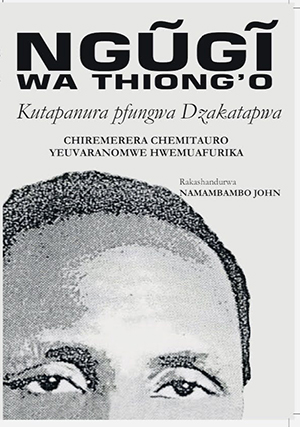
The African college of excellence in the social and human sciences
Dr John Mambambo, 37, a Unisa alumnus, says that his PhD in Philosophy helped him to translate the widely used university prescribed book Decolonising the Mind: The Politics of Language in African Literature into ChiShona, his mother tongue. ChiShona is spoken mostly in Zimbabwe, where it is an official language, and in Mozambique.

Dr John Mambambo
Passionate about education and research, and with a flair for languages, Mambambo, who is originally from Zimbabwe, moved to South Africa in 2008, after obtaining an honours degree, cum laude, in 2007 at Midlands State University in Gweru, Zimbabwe. Recounting his journey, the author recalls the arduous pursuit to further his education and improve his employment prospects.
At the time, Midlands State University had formalised a teaching assistant post for him, to ensure that they retain his expertise. A lecturer post was on the horizon, but he needed a master’s degree to pave the way. However, this was not to be, as Zimbabwe was notoriously plagued by political unrest in 2008, which grinded this ambition to a halt.
In no time, he had found himself in South Africa, where he started off by accepting a teaching post at a high school in Cape Town – a position he occupied until 2014. Even then, deep down, he knew that this was not really what he wanted to do. “I wanted to teach at a university and I knew I could be of greater service in that space – a stark reminder that I needed to register for a master’s degree,” he says.
Mambambo then left teaching to focus on his master’s degree studies with Unisa, which he completed cum laude in 2016. It was during this time that he was encouraged by his supervisor to pursue a PhD. According to Mambambo, his supervisor, after noticing his prolific writing skills, confirmed his own ambitions, which he decided to pursue.
“Ultimately, I registered for my PhD, still with Unisa, an institution which instilled in me discipline,” he says. “There, I developed an understanding that I had to focus, because if I did not, nobody was going to be holding my hand; I had to push.” he adds.
Still on a journey driven by passion, he decided to add his voice and to transform the university landscape. Throughout, he had supervisors who were caring and encouraging, and they would check up on him and offer advice all the way.
It was only a matter of time before Mambambo came across a project that would bring him great acclaim. It was during his PhD studies that Decolonising the Mind: The Politics of Language in African Literature, written by leading African author Ngũgĩ wa Thiongo, caught his attention. “As a prescribed text for both English and African studies at university level, and broadly accepted in those disciplines,” he says, “it made me wonder why such an impactful book, known all around the world and within university circles, was never translated into any other African language.”
As a non-fiction publication, it advocates for linguistic decolonisation and the author’s website cites the book as being “a collection of essays about language and its constructive role in national culture, history, and identity”.

Mambambo aimed for the book to reach grassroots level and for it to be accessed by broader audiences, and he wanted to transform the university landscape and the medium of instruction at universities in support of an African languages’ perspective. “One of the reasons why African languages were not being used and slowly being discarded at universities,” he points out, “is because there were no texts available for them.”
“Why can’t we have academic texts available in African languages, so that universities should not have an excuse for discarding African languages?” Mambambo asks. “If they discard African languages, it should be for other reasons and not because of the unavailability of material.”
He undertook the long and, at times, lonely translation process as a solo project, with no funding to back him up. “For me it was not about the money; it was just me and my passion,” says Mambambo.
He conceded that, along the way, he had to figure things out. He had to seek permission from the author, the publishers and the London-based rights holder and, after some back and forth, he obtained copyright permission. He then had to find himself a publisher to negotiate translation rights on his behalf.
Translated to ChiShona as Kutapanura pfungwa Dzakatapwa, the book was launched in June 2021 at the First-in-Africa Conference of the International Association of Colonial and Postcolonial Linguistics (IACPL). Based on this work, Mambambo bagged a nomination by Rhodes University for a postdoctoral fellowship.
Mambambo says they are now working on a project to expand the translation of the same text into more languages. “Now we are expanding the Decolonising the mind project into other South African, Zimbabwean and Kenyan languages. We are going into the African continent,” he concludes excitedly.
*By Busisiwe Mahlangu, Communications Coordinator, Department of Institutional Advancement
Publish date: 2021/08/10